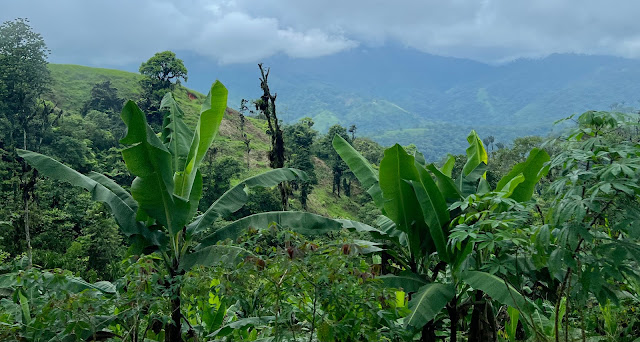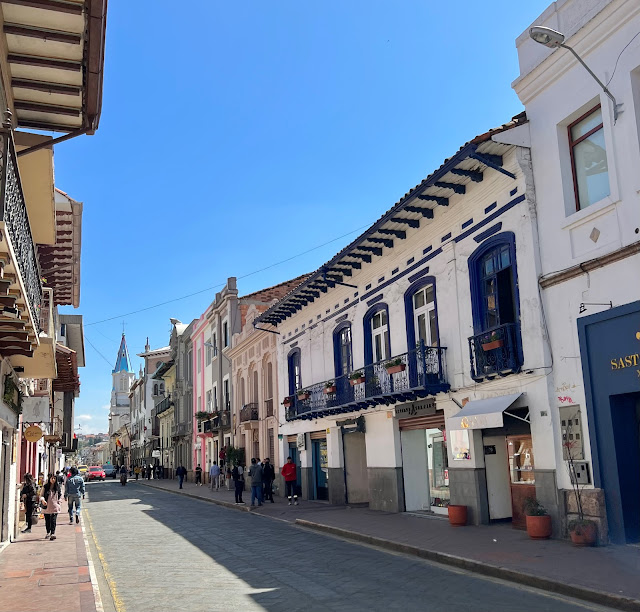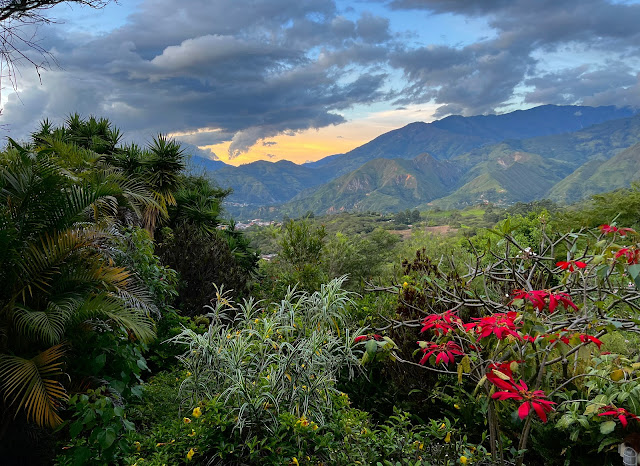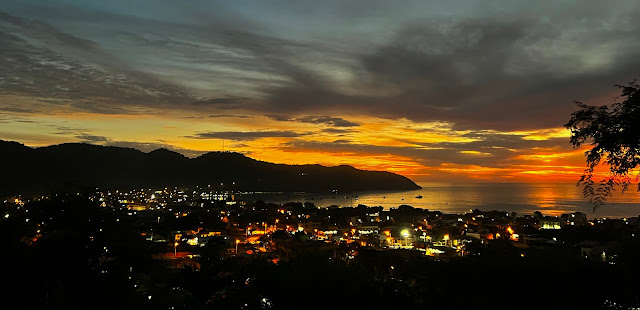I was done with mud.
Unfortunately, mud was not done with me.
I flew from Quito to Guayaquil on the Pacific coast. Guayaquil at 3 million people is the second largest city in Ecuador. Rio Guayaquil forms a vast delta as it reaches the sea.

Guayaquil was just a overnight stop on my way to the beach at Puerto Lopez. I hoped to do some diving in "the poor man's Galapagos." I been to the rich man's Galapagos in 2015, I didn't want to spend that much time or money on this trip. Here's a link to that amazing trip.
Puerto Lopez is about a four-hour bus ride from Guayaquil, by way of the town of Jipijapa (which is not the center of the thriving Ecuadorian hip-hop scene, as I had believed). I felt safe making the trip in the Sagrado Corazon de Jesus.
The scenery through the coast range was lush.
Elvis for mayor!
It had rained the whole night before, and it turns out that most of the streets in Puerto Lopez are dirt. You know what that means. I took a tuk-tuk (the primary public transit in town) to my hotel. Three people were already jammed in the back seat, so I squeezed in beside the driver, half on his seat and half in air, holding desperately on to the vehicle and my two backpacks as we jolted down the rutted road. But when we turned on to the road to my hotel, the mud was waiting.
The fully-laden tuk-tuk could not make it up the slippery hill, so once again I had to slog through the mud to my hotel. Luckily this time it was only a short hike.
La Terrazza turned out to be a beautiful compound overlooking the town and the harbor.
My cabana had a porch with a great view of the gardens, the pool. and the sea. And yes, there was A/C. Puerto Lopez was about 81 degrees as opposed to the high of 89 in Guayaquil, but it was not a dry heat, so the A/C was very welcome.
Puerto Lopez is a typical Latin-American Fishing village/ tourist attraction. Most the tourists here are Ecuadorian as Americans and Europeans tend to go to the Galapagos. The main drag has little to recommend it.
Most of the restaurants and tourist shops are on the road fronting the beach. There are dozens of restaurants, all serving similar food, and all featuring aggressive touts waving menus to lure you in.
I ate at the hotel. Their dining room has an awesome view of the spectacular sunsets.
By the next day, the road had pretty well dried, so I walked down to meet the boat at Native Divers.
They are a funky and friendly group with reasonably good equipment.
A couple vultures were scouring the beach for bits of fish leftover from the morning's catch as we waited for the boat to arrive.
A pelican accompanied us out to the dive site.
The blue skies were filled with frilly clouds.
After a 20-minute ride, we reached a small island inhabited by frigate birds and boobies. We geared up and jumped in. I came up from the initial plunge and a blue-footed booby almost landed on my head. It plopped itself down in the water next to us and swam around our bobbing heads, watching us quizzically. Totally unafraid.
Unfortunately, the rain had churned up the water and the visibility was lousy, 15-20 feet tops. And the surge was intense. I'm happy to let the sea toss me about, but my guide got anxious and went through his air pretty quickly. There were also pronounced thermoclines. One moment the water would be pleasantly warm, the next uncomfortably cold.
It was a shame that the conditions were so poor, because the site was excellent--plenty of soft coral, numerous fish, and one lone turtle. My guide aborted the second dive when he hit half a tank. I still had over 2000 lbs., but I was not unhappy to get out of the water.
The size of the waves gives you a pretty good idea of the strength of the surge.
Back at the beach the frigate birds swooped in to see if we had brought them any fish. Sorry, guys.
These folks did have fish.
There were dozens of these prehistoric-looking birds whirling right overhead the whole time.
And here's why.
From my terrace it was easy to see the murky runoff caused by the rain.
Didn't affect the gorgeous sunset.
The next day, I decided to skip diving and wandered around town instead.
The major charm of visiting a fishing village is the incredibly fresh fish. I had an excellent ceviche on the beach.
I had grilled lobster with garlic sauce.
I had arroz marinara featuring fish, shrimp, squid, clams, and delicious fried sweet bananas.
I ate very well, then strolled on the beach to watch the sunset over the harbor.
The next day, I booked a jungle tour.
I could have done it on horseback, but no, I chose walking.
The jungle as hot and humid. I wore long sleeves and long pants because had been warned that there were swarms of hungry mosquitos. I sprayed myself all over with repellent, my guide, Carlos, gave me some rubber boots, strapped on his machete, and we took off.
The foliage was incredibly lush.
We found a tarantula hole. They are mostly nocturnal, but later in the hike, I almost stepped on a black one about six inches across.
The forest we walked through is a national park so the trees and animals are protected, but the locals are allowed to plant crops here and use the produce to trade for meat and fish in Puerto Lopez.
Here are a few of their coffee plants. They also grow chocolate, bananas, papayas, etc.
The jungle damp is ideal for mushrooms.
And bromeliads.
This little critter is but a shell of his former self. They molt as they grow, leaving their hollow carapaces to decorate the trees.
A river runs through it.
This was not an easy hike. The mud (yes, the mud again) was deep and slippery. I almost lost my boot to the suction several times. Often we hiked up the streambed through the water to avoid the mud.
A huge water spider joined us in the river.
And a small freshwater crab. Later we saw some that were a good six or seven inches across.
Far off we could hear howler monkeys making a racket. We had already come about a mile, and I was getting really tired. Carlos asked me if I wanted to go on, and I was torn. But those damn monkeys kept calling. So I sat down to rest and drink water while Carlos went to find them.
He came back about ten minutes later. He had found them. Muy legos, he said. Well, I simply couldn't live without the sight of some monkeys, so we continued.
The cries got louder and louder, but the critters were well-hidden in the treetops. Carlos cut a path through the dense brush and made very convincing monkey calls.
Finally, there they were. A whole family whooping and hollering.
We watched them for a while, then started the long way back. I had to keep stopping to rest. I was very hot, the air seemed almost too thick to breathe, and I was getting a little lightheaded.
And then we saw a toucan. which gave me a burst of energy.
I finally staggered into Carlos' house, my clothes soaked with sweat, spots before my eyes. The hike had been four-and-a-half miles.
Carlos let me rest for a bit, then took me next-door to his mother's house. She fed me chicken (from her own flock, the chickens kept running in and out of the house as we ate), rice, and delicious guayaba juice. The sugar and calories brought me back to life.
I took a tuk-tuk back to the hotel and got ready to jump in the pool. Just then I got horrible cramps in my thighs. I could barely stand up, but if I sat down the cramps got worse.
Can you say dehydration?
I could have cried, but I didn't have the fluid to spare.
I lay down and drank bottle after bottle of water. I had thought I was drinking enough on the hike, but clearly I was wrong.
Finally, I got better. I was able toddle downtown where I drank lots more juice with dinner (maracuyá, my favorite).
Later I strolled on the beach for one last sunset.
It was Friday night, and Puerto Lopez was in total party mode, but I was ready for a good night's sleep.
P.



































































